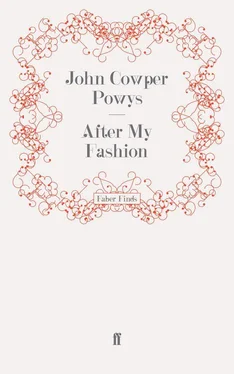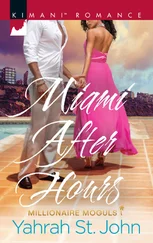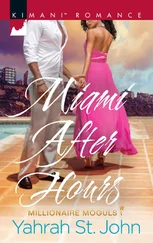‘I give him very good meals,’ she said.
‘I’m sure you do. But he’s an Englishman, my dear, and English— men, whatever they may do in New York, pine for their rainy fields. We don’t want to have to bury our Richard out here do we?’
‘But he’s got no money. He sends home nearly all he makes, as it is.’
‘Well! We must get him the money. A thousand dollars would keep him going till he could get over to Paris. And once in Paris he’d soon pick up again. They know his value over there.’
‘But — a thousand dollars!’
‘It isn’t so much as it sounds, you dear baby. Why, Pat Ryan lent me as much as that only two months ago! I mustn’t go to him for this; but I could sell my pearl necklace.’
Catharine looked at her with tears in her eyes. A wave of vibrant sympathy flowed between the two.
‘You dear!’ cried the younger girl.
Elise smiled. ‘You’d do the same for him. I’m not blind. You’re one of those people, little Cathy, who put their genius into their heart, just as I put mine into my legs!’
Catharine looked at her thoughtfully. ‘Yes, I have got fond of him. But that’s because he’s got so used to me, I expect. It’s a new thing to me to be really wanted .’
The dancer put her arm around her waist. ‘Well! now we’re friends again, I may tell you that I want you most abominably. So you see my cunning design! I pack off our good Richard to his wife and have you all to myself again! For you will come back to me now, child, won’t you? No! don’t shake your head. You must — I can’t be deserted by everyone.’
Catharine looked wonderingly into those mysterious eyes which were neither grey nor blue nor violet nor green, and yet were all those colours together.
‘If you’re very good and very nice, I may teach you to dance,’ said Elise Angel.
Catharine leapt to her feet at those words and clapped her hands. ‘Not really? Do you think I could? That would be simply heaven! I used to dream of that when I was a little girl. And to be taught by you! ’ She snatched at one of the dancer’s hands and kissed it fervently.
‘Meanwhile,’ said Elise, ‘I’ve got to go round and pick up a thousand dollars.’ She rose slowly from the armchair and laid her hand on her Spanish cloak. ‘Richard won’t, I suppose, be too proud to take it when I’ve got it?’ she said, as Catharine arranged the cloak round her shoulders.
Once more they exchanged that curious enigmatic glance with which women converse without the necessity for words.
‘I don’t think so,’ responded the girl smiling. ‘I don’t think he is very proud — in those things.’
‘Well! goodbye, you dear child. I’ll bring the money round to you in a day or two. By the way, why don’t you bring him to see me dance tonight? I’ll tell them at the box office to keep you good seats. But just as you like of course. It won’t matter if you don’t come. Goodbye!’ And she ran lightly down the narrow stairs and let herself into the street.
That last word of Elise’s had a little clouded Catharine’s pleasure.
Somehow she felt reluctant to sit with Richard in a prominent seat at that theatre.
She left her pieces of holly lying on the table and, sitting down with her hands around her knees, fell into deep meditation.
Just very faintly, across the most remote portion of her consciousness, there flickered a vague shadow of suspicion. It was scarcely articulate. It had no definite shape or form. But like a small cloud on the horizon it spoilt the complete harmony of her thoughts. Before Richard’s return, however, she had recovered the balance of her normal generosity and had driven this little cloud altogether out of her mind. The pieces of holly with their red berries were now adorning the ‘Watteau’ print and the table was decorated with copper-coloured chrysanthemums, candied ginger, New England grapes and a bottle of California wine.
He arrived at half past six. He was already in better spirits than he had been in for some long while, and the sight of his ‘young monk’, as he called her, with this festive background gave him a thrill of pleasurable excitement.
They were halfway through their meal, drinking wine and tea in shameless propinquity, and laughing with most keen amusement over what Richard called ‘crackers’ and she called ‘ bon-bons ’, when Catharine broached the subject of Elise’s visit and her offer of tickets for that night.
It was only her sense of honour that made her refer to this latter point, as she herself would have greatly preferred to continue, in the quiet of their own ménage , an evening so auspiciously commenced. But her hope was that Richard would, as she said to herself, ‘turn the thing down’. Whether it was the California wine, however, or a sudden craving to see his ivory goddess dance her Dionysian dance on this ‘night of all nights in the year’, he leaped eagerly to meet the suggestion, and at once began to hurry through the rest of the meal.
Catharine was surprised at herself over the vexation which this interruption of their little feast caused her; but she fell in gallantly with his mood and while they were washing up the things together the effort she had been making, ever since Elise first appeared, to be ‘good’ in the whole affair was rewarded by one of those rare inspirations of disinterested happiness which selfish people never know and which are by no means as frequent in the experience of the unselfish as ideal justice would demand.
Thus it happened that when, an hour later, they found themselves seated side by side in the new Stuyvesant Theater there was hardly a more excited or more carefree pair among all that holiday-thrilled Bohemian audience.
The new Stuyvesant was in every respect worthy of the great artist. It had been designed by a young acquaintance of Roger Lamb; Richard and Catharine whispered to each other a mutual recognition, as they looked round them, of the passionate theories of their dead friend now realized for the first time. The decoration was not only simple; it was austere. It was rigid and reserved in a manner suggestive of Byzantine work. There was about it something of that kind of ritualistic imagination which, perhaps erroneously, the modern world has come to name ‘archaic’.
Richard could not help becoming conscious that here, in the middle of this orgy of raw newness, there had been evoked something more suggestive of the passion of the human spirit ransacking the remote past and steering into the unborn future than anything in London or Paris. He recalled Karmakoff’s casual remark about certain affinities between Russia and America; and he whispered to Catharine that Roger Lamb’s idea of a revival of real mythology , of something that was both adventurous and religious, was actually present in what they looked at now.
The dancer’s inevitable black curtains were there; but they were there for the first time as an organic portion of a setting that might have been designed for some ancient classic ritual, some real worship of the Platonic idea of beauty, envisaged as a palpable presence. What the new Stuyvesant represented was preeminently an achievement of youth, of youth coming sternly and resolutely into its own, after the deadly disillusionments of the recent war. The actual fabric of the building itself — its contours, its curves, its nobly designed blank spaces — was all part of a musical rhythm which only reached its consummation when Elise began to dance.
It seemed to both Richard and Catharine that Elise had acquired yet more subtle art since they had last seen her. Her first dance was one to a certain musical fantasy written by a little-known Russian composer who was at that moment coming into fame in Revolutionary Moscow. Richard recognized Karmakoff’s influence over the dancer in this choice; and he recognized it without the least touch of jealousy.
Читать дальше











